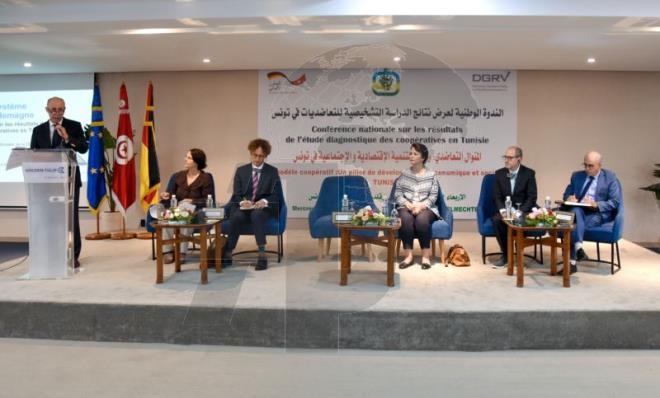Caught up, constantly, by its tumultuous past, the cooperative fabric in Tunisia is facing today many challenges, including the lack of knowledge both on the part of the administration and banks and other financial institutions.
In this context, a recent study prepared by the Ministry of Agriculture, Fisheries and Water Resources, in association with the Tunisian chapter of the Tunisian-German Association for Cooperative Development, notes that it is the difficulty of access to funding related precisely to this lack of knowledge of the specifics of cooperatives from banks, combined with fears of non-solvency, which is the main constraint faced by the cooperative fabric in Tunisia.
The results of this study entitled “The cooperative model: a pillar of economic and social development in Tunisia” were presented to journalists at a press conference attended by the Minister of Agriculture, Water Resources and Fisheries, Mohamed Elyes Hamza Wednesday.
Along with these difficulties of access to finance, the cooperative fabric in Tunisia also suffers, according to the study, from the lack of a public structure responsible for cooperatives and a lack of knowledge of cooperatives from public administrations including regional. This complicates the procedure for their creation especially in sectors other than agriculture.
This fabric also suffers from the absence of a specific directory for cooperatives within the national business register, difficulties in registering under the name “cooperative”, unfair competition from the informal economy and problems of poor management due to a lack of qualifications.
Proposed remedies
To address the problem of access to finance and other challenges, Moez Soussi, professor at the Institute of Higher Commercial Studies of Carthage and co-author of the study, advocated the establishment of a new funding mechanism specific to cooperatives, led by a body specializing in these types of unconventional financing, given that in addition to the economic aspect, the role of the cooperative model has social and environmental dimensions.
He also called for the creation of a special fund dedicated to investment in cooperatives pending the constitution, later, of a cooperative bank supported by funding associations in this field.
In this regard, Moez Souissi advocated policy choices ensuring the reconciliation with the old cooperative model adopted in the late 60s, in accordance with developments in the national context and expectations of young people.
The academic proposed solutions, case by case, to the difficulties of cooperatives according to the situation and needs of each cooperative, advising to avoid global plans not very productive.
In addition, the study recommended to collect the legal texts relating to cooperatives in a legal guide divided according to sectors and categories and to revise some laws, to create representative structures of cooperatives, to integrate the promotion of cooperatives as part of strategies and development plans and to implement a training and support plan.
Strengthening the cooperative model
Minister of Agriculture, Water Resources and Fisheries, Mohamed Elyes Hamza, stressed the importance of this study which makes the diagnosis of the cooperative model, emphasizing the reluctance of some farmers and producers to join this experience and mentioning the failure of some cooperatives to meet their commitments to their members.
He said this study could be a basis for promoting and strengthening the cooperative model according to the principle of social solidarity in the agricultural and non-agricultural fields, so as to include cooperatives as well as popular societies and service companies.
This scientific reference will promote, according to him, the development of a new vision for investment in cooperatives and improving their productivity.
As a testimony, the chairman of the board of directors of the Cooperative “Agricultural Services Beni Khalled, Sadok Ben Amara, spoke of the difficulties of access to bank financing for his cooperative and unfair competition from the private sector, which they enjoy such access.
He said that the problem of funding has become threatening to the sustainability of his cooperative that plays an important economic and social role in Cap Bon, which has reduced the number of its members to 1200 currently.
Established in the 50s, this cooperative specializes in the export of agricultural products such as potatoes and citrus, the collection of milk at a rate of 35 thousand liters per day, the mobilization of agricultural inputs (seeds, oil, plants …), agricultural extension and production of fodder.
According to the study presented Wednesday in Tunis, the cooperative fabric in Tunisia is currently composed of 443 cooperatives with more than 48317 members. These include 390 mutual companies of agricultural services, 18 cooperative units of agricultural production operating state land and 35 cooperatives in sectors other than agriculture (handling within the wholesale markets, textiles, crafts, trade …).
The agricultural activity alone covers about 90.88% of all cooperators and 92% of all cooperatives.
The agricultural cooperatives use more than 16 thousand hectares of state land. The participation rate of women in all cooperatives is about 6.29%.













